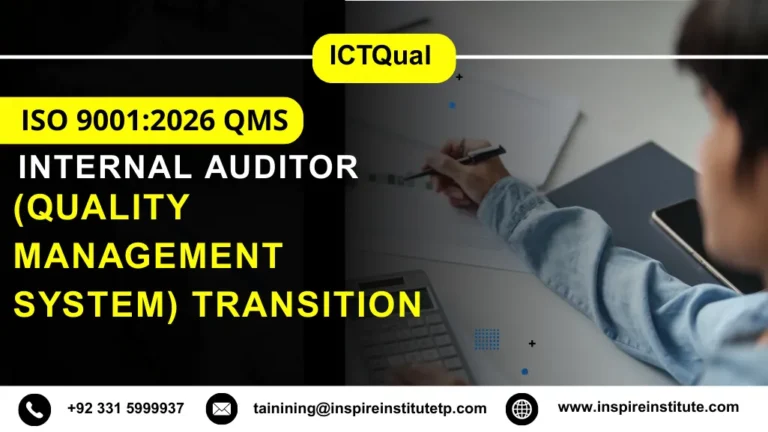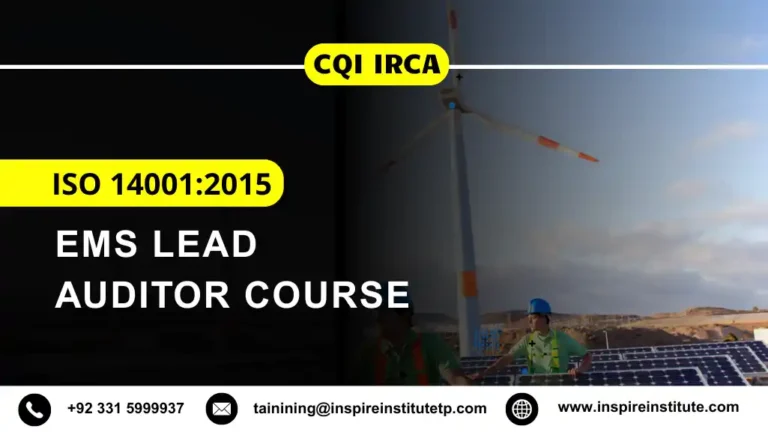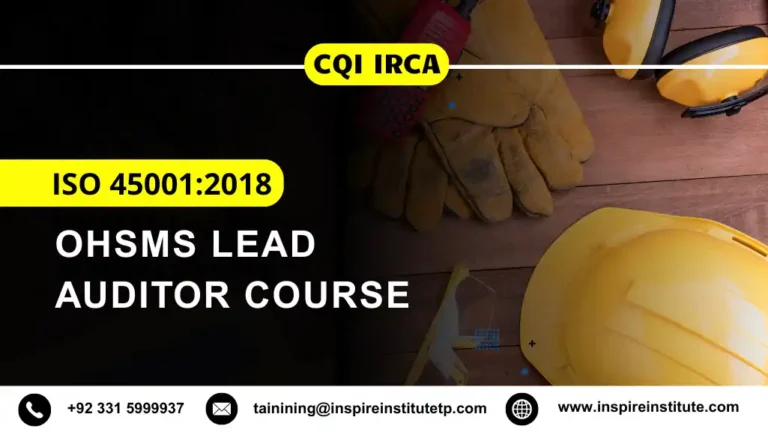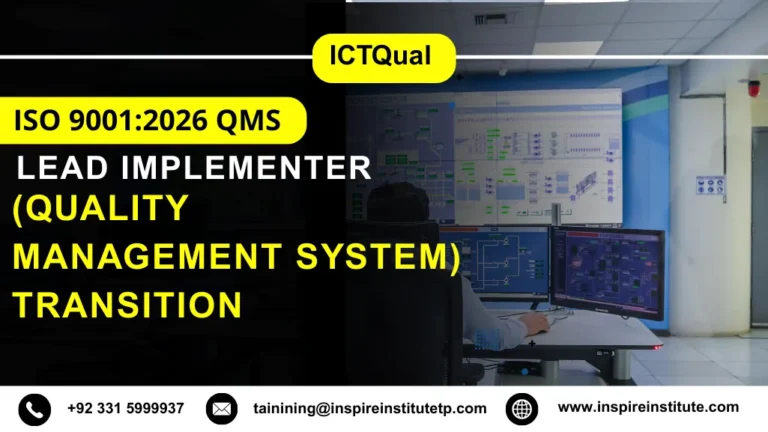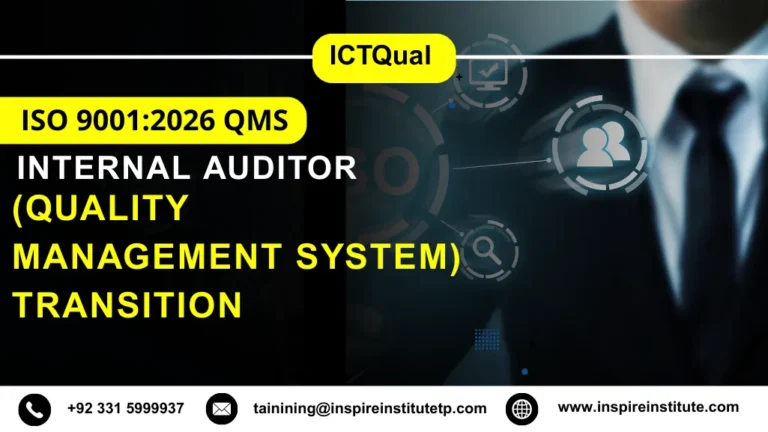ISO 9001:2015 Quality Management System Lead Auditor Course
The ISO 9001:2015 Quality Management System Lead Auditor Course is a specialized training program designed for individuals aspiring to become proficient auditors of quality management systems. This course provides comprehensive knowledge of the ISO 9001:2015 standard, focusing on its principles and requirements. Participants will learn how to plan, conduct, and report on audits effectively, ensuring organizations meet quality standards and enhance operational efficiency. The program combines theoretical knowledge with practical exercises, equipping learners with the skills needed to lead audit teams and implement continuous improvement processes. Ideal for quality professionals, managers, and auditors, this course is essential for those looking to advance their careers in quality management and contribute to organizational excellence
Why Choose this Qualification
Choosing the ISO 9001:2015 Quality Management System Lead Auditor Course offers several significant benefits:
- Expertise in Quality Management: Gain in-depth knowledge of the ISO 9001:2015 standard, equipping you with the skills to assess and improve quality management systems effectively.
- Career Advancement: This qualification enhances your employability and opens doors to advanced roles in quality assurance, auditing, and management within various industries.
- Practical Skills Development: The course emphasizes practical auditing techniques, enabling you to plan, conduct, and report on audits with confidence and professionalism.
- Global Recognition: ISO 9001 is an internationally recognized standard, and this qualification is respected worldwide, adding value to your professional credentials.
- Continuous Improvement Focus: Learn how to identify areas for improvement within organizations, helping drive efficiency, reduce waste, and enhance customer satisfaction.
- Networking Opportunities: Engage with fellow professionals and industry experts, expanding your professional network and learning from their experiences.
- Preparation for Lead Auditor Roles: Equip yourself with the competencies necessary to lead audit teams, making you a vital asset to any organization.
By choosing this qualification, you invest in your future, gaining the skills and knowledge to excel in quality management and contribute to organizational success.
Course Overview
Ofqual Regulated Qualification
Class Duration : 5 days online classes
Average Completion Time:
2 to 3 weeks
Study Units: 6 Units
Evidence & Assignment Based
Qualification Structure
The ISO 9001:2015 Quality Management System Lead Auditor Course consists of 6 mandatory unit for this qualification.
Mandatory Units
Who Should Take This Course
The ISO 9001:2015 Quality Management System Lead Auditor Course is ideal for a variety of professionals seeking to enhance their skills in quality management and auditing. Here are some key groups who would benefit from this course:
- Quality Managers and Auditors: Individuals responsible for developing, implementing, and maintaining quality management systems will gain essential skills to perform effective audits.
- Internal Auditors: Those conducting internal audits to assess compliance with ISO 9001:2015 standards will learn the techniques needed to evaluate processes and ensure adherence to quality standards.
- Compliance Officers: Professionals focused on regulatory compliance can benefit from understanding ISO 9001:2015 requirements and how to audit for compliance.
- Management Representatives: Individuals acting as the liaison between management and auditing teams will learn how to facilitate audits and drive improvements based on audit findings.
- Consultants: Quality management consultants seeking to expand their expertise in ISO standards will gain practical knowledge to assist clients in achieving certification.
- Production and Operations Managers: Those involved in production processes will learn how to align operations with quality management principles, leading to improved efficiency and product quality.
- Continuous Improvement Practitioners: Professionals focused on process improvement initiatives will benefit from understanding how effective auditing contributes to overall organizational performance.
- Anyone Seeking ISO Certification: Organizations planning to pursue ISO 9001:2015 certification will find this course valuable for preparing their teams to meet certification requirements.
By completing this course, participants will develop the knowledge and skills necessary to conduct effective audits, contribute to organizational quality objectives, and enhance overall performance.
.
Course Benefits
Here are some key benefits of taking the ISO 9001:2015 Quality Management System Lead Auditor Course:
- Enhanced Audit Skills: Participants will learn effective auditing techniques, enabling them to conduct thorough and objective assessments of quality management systems.
- In-depth Knowledge of ISO 9001:2015: The course provides comprehensive insights into the ISO 9001:2015 standard, including its principles, requirements, and application.
- Improved Quality Management Practices: Attendees will acquire the tools and knowledge to implement and maintain effective quality management systems, leading to better organizational performance.
- Career Advancement Opportunities: Completing this course can enhance career prospects, as organizations often prefer certified lead auditors for key quality management roles.
- Understanding of Compliance Requirements: Participants will gain a clear understanding of compliance obligations, helping organizations avoid penalties and maintain regulatory standards.
- Facilitation of Continuous Improvement: The course emphasizes the role of auditing in identifying areas for improvement, fostering a culture of continuous enhancement within organizations.
- Networking Opportunities: Engaging with peers and instructors during the course can lead to valuable professional connections in the field of quality management.
- Practical Application: The course often includes case studies and practical exercises, allowing participants to apply theoretical knowledge to real-world scenarios.
- Certification Preparation: Completing the course prepares participants for certification as lead auditors, adding credibility to their professional qualifications.
- Contribution to Organizational Success: Equipped with new skills and knowledge, participants can drive quality initiatives that enhance customer satisfaction and operational efficiency.
Overall, this course equips individuals with the expertise needed to lead audits effectively, supporting both personal growth and organizational success.
Eligibility Criteria
Educational Background: A minimum of a high school diploma or equivalent is required; a degree in management, engineering, or a related field is preferred.
Work Experience: At least two years of professional experience in quality management, auditing, or a related field.
Familiarity with ISO Standards: Basic understanding of ISO 9001:2015 principles and concepts is recommended.
Previous Auditing Experience: Experience in conducting internal audits is beneficial but not mandatory.
Commitment to Continuous Learning: Participants should demonstrate a willingness to engage in ongoing professional development in quality management.
Language Proficiency: Proficiency in the language of instruction to understand course materials and participate in discussions effectively.
FAQs
The Qualification Process
Here is a step-by-step guide to help you understand the entire journey from pre-registration to certification:
- Self-Assessment:
Begin by evaluating your eligibility for the course. Ensure you meet the entry requirements, such as relevant qualifications or professional experience, as outlined for the program. - Registration:
Complete your registration by submitting the required documents, including a scanned copy of a valid ID, and pay the necessary registration fee. This is your first official step in the qualification process. - Induction:
An assessor will conduct an induction session to verify your eligibility and introduce you to the evidence requirements. During this stage:- If the assessor finds that you meet all the necessary criteria, you will proceed to the next step.
- If you do not meet the entry requirements, your registration will be canceled, and your fee will be refunded.
- Evidence Submission:
Based on the assessment criteria, you will need to submit evidence demonstrating your knowledge and competence. Consult with your assessor if you need clarification on the type and nature of the evidence required. This evidence could include assignments, projects, case studies, or professional experiences related to sustainability management. - Feedback and Revision:
The assessor will review your submitted evidence and provide feedback. Evidence that meets the required criteria will be marked as “criteria met.” If there are any gaps, the assessor will highlight them, and you will need to address those gaps by revising and resubmitting the evidence. - Competence Evidence:
Submit your final evidence demonstrating that you have successfully achieved all the learning outcomes. The assessor will mark your submission as “Criteria met” once everything is up to standard. - Internal Quality Assurance (IQA):
After your evidence is approved by the assessor, the Internal Quality Assurance Verifier (IQA) will review it to ensure that the assessment was carried out consistently and according to ISO standards. - External Verification:
The IQA then presents your portfolio to ISO External Quality Assurance Verifiers (EQA) for final confirmation. The EQA may contact you directly to verify the authenticity of your evidence. - Certification:
Once all internal and external checks are completed to satisfaction,ISO will issue your official certificate, confirming that you have successfully achieved the qualification.
This comprehensive process ensures that learners demonstrate all necessary competencies and meet the high standards required for the ISO 9001:2015 Quality Management System Lead Auditor Course.


